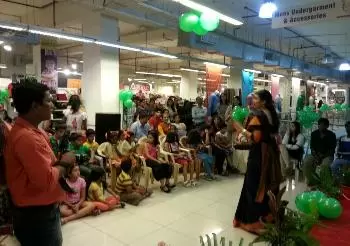Green living begins at everyone's own home

14-June-2013
Vol 4 | Issue 24
When this scribe used to visit Mumbai’s iconic co-operative neighbourhood retail outlet, ‘Sahakari Bhandar’ about five years ago, the groceries would be packed in big plastic bags.
At that time the voice of green crusaders was growing shrill on the plastic menace and one felt a tinge of guilt every time one carried home the plastic bags.
 |
|
Monisha and her friends have met with success in their efforts to promote green living
|
Efforts to switch to cloth bags posed a challenge.
In a pleasant surprise though, the entire chain of Sahakari Bhandars (22 stores) in Mumbai went green with a vengeance from June 5, 2009 and started levying a ‘green tax’ of Rs 2 for providing plastic bags.
It had a big psychological effect on the shoppers who got the message and started bringing cloth or jute bags from home.
Influencing the retail chain’s decision to go green were a band of homemakers who had come together to form RUR (Are you Reducing, Reusing, Recycling), a green initiative to create eco-conscious citizens.
Started in a small way in 2008 with the help of friends and neighbours, Monisha Narke with a Masters in Industrial Engineering from Stanford University, is now into several projects to promote green living.
“At Sahakari Bhandar stores the campaign has been successful,” says Monisha, revealing that in the first four months itself the stores had reduced their usage of plastic bags by 70 percent.
Currently her team is focusing on zero waste management, simple composting solutions, awareness workshops, green products and more.
Monisha had always been concerned about accumulation of waste in public places and roadsides.
It was during her visits to her farm in the coastal town of Umbergaon (Gujarat), 150 km from Mumbai, that she had noticed the growing pile of waste from Dadar to Umbergaon stations.
She realized it was time the community learned to recycle waste. In 2008 she took a sabbatical from her job and got down to spreading green awareness.
Starting from home, she found her family of six, including her in-laws, generated 1 kg waste daily, of which 80 percent was recyclable.
Monisha began with segregating waste at home, and then studied the travails of rag pickers, who worked without any safety measures.
At recycling units in Dharavi she noticed that plastic was being burnt causing toxic fumes.
She realized that educating the homemakers to segregate waste at homes in two separate bins for recyclable and non-biodegradable waste was necessary.
Few like-minded mothers from her kid’s school joined her initiative and a core team consisting of Jashvi, Malavika, Sumegha, Sejal, Yamini and herself formed RUR.
If Team RUR teaches the little ones in schools to sow the seeds of a greener world then their own kids insist on making Ganpati idols at home from mud rather than buy chemically painted ones from shops.
The mothers have successfully demonstrated that green living starts from home.
Monisha says her own farm at Umbergaon has a solar powered mud house with bathrooms that have water-proof composite roofing made from recycled tetra pack cartons.
 |
|
An awareness programme in progress
|
The chikku and mango plantation are organically grown.
In Mumbai their housing society ‘Fortune Heights’ in Mahim with 28 families manage waste efficiently.
They pay Rs 3500 to a rag-picker who helps in composting the waste. Vegetable and fruit peels are dumped in vermin-compost bins and they get fine manure.
RUR promotes cloth bags and the project provides jobs for women. “My sister-in-law and I stitch cloth bags from used bed sheets and other used clothes that RUR gives us,” said Fatima, an illiterate resident of Premnagar slum in Worli.
A part of her Rs3000-Rs4000 monthly income comes from RUR.
RUR also recycles used tetra paks with help of Sahakari Bhandar, Daman Ganga Recycled Resources and Tetra Pak Company. For encouraging recycling they have put bins in retail stores to drop used tetra paks and plastic bags.
“A tetra pak is made of paper, plastic and metal. When it is recycled the paper is shredded to make boards and notebooks while metal and plastic make effective waterproof roofing,” said Sejal Kshirsagar, RUR team member.
The collection of tetra paks is done by Stree Mukti Sanghatan, an organization to uplift women in Maharashtra.
Twenty three desks made from recycled tetra paks were donated to a school in Chunabati. Sejal said that recently RUR donated similarly made 65 desks to two other schools.














